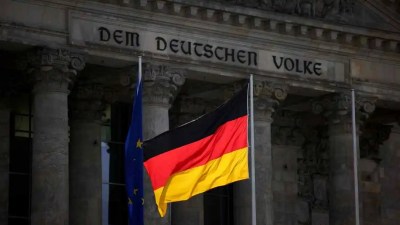Stay updated with the latest - Click here to follow us on Instagram
France’s protests leave Macron in pension reform gridlock
France’s third round of demonstrations and protest marches on Tuesday drew 615,000 people across the country, according to Interior Ministry figures, while the CGT union counted 1.8 million, Agence France-Presse reported.
 French President Emmanuel Macron gestures as he poses for a photograph. (Reuters/file)
French President Emmanuel Macron gestures as he poses for a photograph. (Reuters/file)
The stalemate between Emmanuel Macron’s government and labor unions deepened as France headed into a third week of transport strikes over the president’s effort to reform the country’s pension system, threatening further turmoil during the busy holiday season.
Negotiations between the unions and the government have been suspended. Complicating matters, Macron’s point man for pension reform resigned on Monday after it was revealed that he failed to report multiple side jobs, which is forbidden by French law.
While Macron has barreled through reforms of tax and labor laws, the current divide shows how deeply the French are wedded to their pension system. Reforming it is the crown jewel of Macron’s effort to modernize the country by merging 42 separate pension regimes and offering incentives to push back the age when workers retire to 64 from 62 in 2027.
France’s third round of demonstrations and protest marches on Tuesday drew 615,000 people across the country, according to Interior Ministry figures, while the CGT union counted 1.8 million, Agence France-Presse reported.
This compares with the first march on Dec. 5, which drew more than 800,000 people, the biggest turnout since Macron took office in May 2017. The second march on Dec. 10 had fewer than half that, according to the Interior Ministry. Prime Minister Edouard Philippe told parliament Tuesday he was determined to push through the reforms.
“The objective is very simple, to guarantee the accounts will be balanced in 2027,” Philippe said. “If our social partners come up with a better proposition that guarantees equilibrium by then, we’ll take it.”
The prime minister has invited labor unions and employer organizations for talks on Wednesday, followed by a joint meeting on Thursday, Agence France-Presse reported. CGT head Philippe Martinez said at the start of Tuesday’s march that the union would meet in the coming days to decide whether to halt the strikes over the Christmas period.
‘Kill the Economy’
Macron’s administration has said it could agree to roll back some aspects of the plan but it promised to maintain the project that would end the special status of many public service workers, from metro drivers to Paris Opera dancers, and ensure that pension payments don’t place a burden on the state budget.
CFDT head Laurent Berger said at the start of the march that his union was ready to continue strikes in the new year if the government didn’t listen to its demand to scrap plans to raise the full retirement age to 64. He reiterated that he supports a universal points-based pension system.
“If we are not heard, we will be back again in January,” Berger said. ““I hope the government will hear us, and in that case we will resume discussions.”
Read more: Team Macron Ready to Ride Out Anything French Unions Throw at It
In an interview published Tuesday in La Croix newspaper, Berger said one option could be to increase contributions rather than raising the retirement age, a solution not favored by the government.
“Raising contributions means less spending power for workers or more charges for employers; it would kill the economy,” Budget Minister Gerald Darmanin said in an interview with LCI television Tuesday.
Berger said his union would resume talks with the government on Wednesday, warning the prime minister that a reform that puts “budget priorities first” would face opposition.
Festive Truce?
The strikes, which started on Dec. 5, are creating havoc for workers commuting on public transportation — mostly in and around Paris — and leading to hundreds of miles of traffic jams around the city. They could eventually weigh on the economy as people try to finish their holiday shopping and prepare travel plans.
The government has called for a truce over the Christmas period. Berger concurred, saying blocking people during the festivities would be “bad for our image.”
Complicating matters for Macron, Jean-Paul Delevoye, his pension chief, resigned on Monday after after he failed to declare multiple paid and unpaid positions in organizations including think-tanks and trade groups. The French presidency said he would soon be replaced.
French Morale
Public opinion in France is divided. Macron’s approval rating climbed 2 points to 30% while Prime Minister Edouard Philippe’s is up 4 points to 30%, according to an Elabe poll for Les Echos and Radio Classique on Monday.
And that’s while 54% of people either support the strikes or are sympathetic to them, according to an Ifop poll published on Sunday.
The French also support some aspects of the reforms, the Ifop survey showed. About two-thirds agree with phasing out the special retirement plans, while only 37% support pushing back the age for retirement with full pension to 64.
Bank of France Governor Francois Villeroy de Galhau played down the impact the strikes may have on the economy, saying in an interview with French daily Le Figaro that “our experience is that in the end these movements don’t weigh much on economic growth.”
France’s Insee statistics agency concurred, saying the protests would have a limited impact on economic growth, especially if unions suspend their action during the holiday season.
Yet the strikes are fraying the nerves of commuters having to squeeze into the few trains and buses still running or sitting in miles of traffic jams.
“The time has come to find a way out because the consequences are serious,” French Finance Minister Bruno Le Maire said on RMC radio on Monday. “This conflict is weighing on the morale of the French people.”
- 01
- 02
- 03
- 04
- 05































